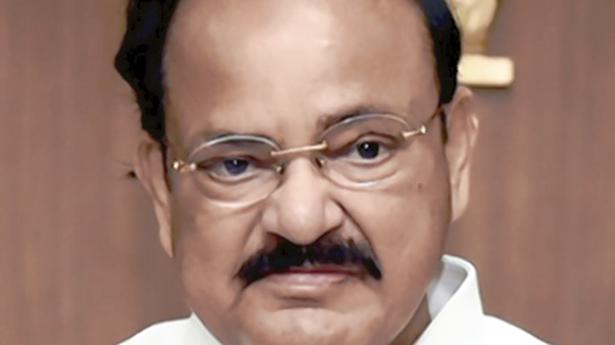
Water is life, we must protect it: Vice-President
The Hindu
Three-day national WASH Conclave commences
Vice-President M. Venkaiah Naidu has urged citizens to protect water “for ourselves as well as for future generations”, stating that ‘jal hi jeevan hai (water is life)‘.
The National Institute of Rural Development and Panchayati Raj (NIRDPR) and UNICEF, in collaboration with the Ministry of Panchayati Raj, the Ministry of Jal Shakti, is organising a three-day national Water, Sanitation and Hygiene (WASH) conclave- 2022, virtually, from February 23 to 25, in which development partners from across the country are gathering online for knowledge exchange and action on WASH-related issues.
Addressing the participants after inaugurating the conclave, Mr. Naidu said water and sanitation is a significant sector because any progress made in this one sector will have an impending possibility of reflecting in many of the development indicators positively such as good health and well-being. “The culture of washing hands and legs first thing after reaching home and before every meal had been gradually fading. The COVID-19 pandemic brought handwashing and hygiene on top of the preventive healthcare agenda. We want the pandemic curve to flatten. But hygiene practices such as handwashing with soap at critical times, should continue,” he said.
In the last two-and-half years, despite the pandemic, 5.81 crore households have been given functional house tap connection, said Union Minister of Jal Shakti Gajendra Singh Shekhawat. “Today more than 9 crore households have provision of tap-water supply. Six states have already achieved 100% coverage, one of which is Telangana. There are 100 districts, 1,141 blocks, 1.38 lakh villages that have been covered so far,” he said, adding that they are working on ease of living, and ‘Leave no one Behind’.
UNICEF-India country representative Gillion Mellsop said the twin goals to guarantee access to safe water for 1.3 billion Indians, and to build the mammoth infrastructure of safe sanitation for all will unleash well-being of children, empowerment of women and mothers, as well as social and economic freedom for the most vulnerable sections.
Director General of NIRDPR-Hyderabad G. Narendra Kumar said: “The NIRDPR is taking this initiative to bring relevant ministries of the government and the non-governmental WASH sector players with a view to carrying forward the twin missions of Swachh Bharat, and Har Ghar Jal.”

Hampi, the UNESCO-recognised historical site, was the capital of the Vijayanagara empire from 1336 to 1565. Foreign travellers from Persia, Europe and other parts of the world have chronicled the wealth of the place and the unique cultural mores of this kingdom built on the banks of the Tungabhadra river. There are fine descriptions to be found of its temples, farms, markets and trading links, remnants of which one can see in the ruins now. The Literature, architecture of this era continue inspire awe.

Unfurling the zine handed to us at the start of the walk, we use brightly-coloured markers to draw squiggly cables across the page, starting from a sepia-toned vintage photograph of the telegraph office. Iz, who goes by the pronouns they/them, explains, “This building is still standing, though it shut down in 2013,” they say, pointing out that telegraphy, which started in Bengaluru in 1854, was an instrument of colonial power and control. “The British colonised lands via telegraph cables, something known as the All Red Line.”

The festival in Bengaluru is happening at various locations, including ATREE in Jakkur, Bangalore Creative Circus in Yeshwantpur, Courtyard Koota in Kengeri, and Medai the Stage in Koramangala. The festival will also take place in various cities across Karnataka including Tumakuru, Ramanagara, Mandya, Kolar, Chikkaballapura, Hassan, Chitradurga, Davangere, Chamarajanagar and Mysuru.








